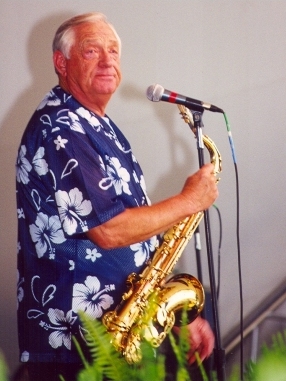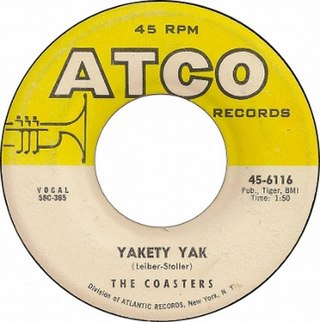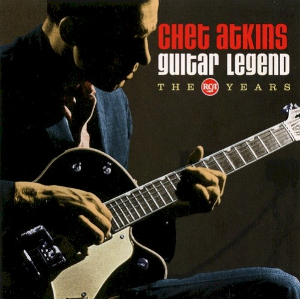Related Research Articles

Chester Burton Atkins, known as "Mr. Guitar" and "The Country Gentleman", was an American musician who, along with Owen Bradley and Bob Ferguson, helped create the Nashville sound, the country music style which expanded its appeal to adult pop music fans. He was primarily a guitarist, but he also played the mandolin, fiddle, banjo, and ukulele, and occasionally sang.

Homer Louis "Boots" Randolph III was an American musician best known for his 1963 saxophone hit "Yakety Sax". Randolph was a major part of the "Nashville sound" for most of his professional career.

"Yakety Sax" is a pop novelty instrumental jointly composed by James Q. "Spider" Rich and Boots Randolph. Saxophonist Randolph popularized the selection in his 1963 recording, which reached number 35 on the pop charts. Comedian Benny Hill later made it more widely known as the closing theme music of The Benny Hill Show. The piece is considered Randolph's signature work.

"Mr. Sandman" is a popular song written by Pat Ballard and published in 1954. It was first recorded in May of that year by Vaughn Monroe & His Orchestra and later that year by the Chordettes and the Four Aces. The song's lyrics convey a request to "Mr. Sandman" to "bring me a dream" – the traditional association of the folkloric figure. The pronoun used to refer to the desired dream is often changed depending on the sex of the singer or group performing the song, as the original sheet music publication, which includes male and female versions of the lyrics, intended.

"Yakety Yak" is a song written, produced, and arranged by Jerry Leiber and Mike Stoller for the Coasters and released on Atco Records in 1958, spending seven weeks as #1 on the R&B charts and a week as number one on the Top 100 pop list. This song was one of a string of singles released by the Coasters between 1957 and 1959 that dominated the charts, making them one of the biggest performing acts of the rock and roll era.

Neck and Neck is a collaborative album by American guitarist Chet Atkins and British singer-songwriter and guitarist Mark Knopfler, released on October 9, 1990, by Columbia Records. "Poor Boy Blues" was released as a single.
"Walk, Don't Run" is an instrumental composition written and originally recorded by jazz guitarist Johnny Smith in 1954.

More of That Guitar Country is the twenty-seventh studio album by US country musician Chet Atkins. It is a follow-up to his Guitar Country release and was more successful. His rendition of "Yakety Sax" by Boots Randolph earned Atkins a hit on the country singles charts. A mix of traditional fingerpicking, country-flavored pop and traditional country, the album peaked at number 4 on the Billboard Country charts.

Chet, Floyd & Boots is a studio album by American guitarist Chet Atkins, pianist Floyd Cramer and saxophone player Boots Randolph. Boots had a novelty hit with Yakety Sax which Chet covered, playing the saxophone lead on guitar, as Yakety Axe - which also became a hit. Cramer was a regular session musician at the Nashville studios, playing with a multitude of artists including Elvis Presley and Brenda Lee, helping to define the "Nashville Sound" that Atkins had also helped develop. The trio briefly toured together.

Guitar Legend: The RCA Years is a two-disc compilation recording by American guitarist Chet Atkins. The 50 tracks included here focus on his first recordings in 1947 to the 1977 release Nashville Guitar Quartet.

The Best of Chet Atkins is a compilation recording by American guitarist Chet Atkins, released in 1964.

The Essential Chet Atkins is a two-disc compilation recording by American guitarist Chet Atkins, released in 2007 on the Legacy label.

The Best of Chet Atkins & Friends is a compilation recording by American guitarist Chet Atkins, released in 1976. It peaked at number 25 on the Billboard Country Albums charts in 1977.
"Gotta Travel On" is an American folksong. The earliest known version was printed in Carl Sandburg's The American Songbag in 1927 under the title "Yonder Comes the High Sheriff" and several variations were recorded in the 1920s, but the best known version is credited to Paul Clayton, The Weavers, Larry Ehrlich, and Dave Lazer and was first recorded by Pete Seeger in 1958.
And Then Came Chet Atkins is a live album by guitarist Chet Atkins, released in 1979.
"Meet Mister Callaghan" is a 1952 song written by Eric Spear and performed by Les Paul in a hit recording.
"O (Oh!)" is a song written by Byron Gay and Arnold Johnson and performed by Ted Lewis and His Band. It reached No. 13 on the U.S. pop chart in 1920.
"Sail Along, Silv'ry Moon" is a song written by Harry Tobias and Percy Wenrich in 1937 and performed by Bing Crosby. It reached #4 on the U.S. pop chart in 1937. Outside of the US, the song peaked at #1 in Canada, Germany and Norway.
"The Happy Whistler" is a song written and performed by Don Robertson. It reached #6 on the U.S. pop chart and #8 on the UK Singles Chart in 1956.
"Why Don't They Understand" is a song written by Jack Fishman and Joe Henderson and performed by George Hamilton IV. It reached #10 on the U.S. pop chart, #22 on the UK Singles Chart, and #18 in Canada in 1958.
References
- ↑ ""Sleep" Rights Denied to Vogel". Billboard. 62 (31): 11. 5 August 1950.
- ↑ "Waring Still Rehearses Theme Song". Electricity on the Farm. Dun-Donnelly Publishing Corporation. 1943.
- ↑ "Les Paul, "I'm Sitting on Top of the World" Single Release" . Retrieved February 26, 2019.
- ↑ "Little Willie John, "Sleep" Chart Positions" . Retrieved February 26, 2019.
- ↑ "Tommy Dorsey and His Orchestra, "Wake Up and Live" Single Release" . Retrieved February 26, 2019.
- ↑ "Urbie Green and His Big Band, All About Urbie Green and His Big Band" . Retrieved February 26, 2019.
- ↑ "The Chico Hamilton Quintet, Chico Hamilton Quintet in Hi Fi" . Retrieved February 26, 2019.
- ↑ "Billy Vaughn with His Orchestra, "Sleep" Single Release" . Retrieved February 26, 2019.
- ↑ "Boots Randolph, Boots Randolph's Yakety Sax" . Retrieved February 26, 2019.
- ↑ "Lawrence Welk and His Orchestra, Last Date" . Retrieved February 26, 2019.
- ↑ "Chet Atkins, Chet Atkins' Workshop" . Retrieved February 26, 2019.
- ↑ "Pat Boone, Moody River" . Retrieved February 26, 2019.
- ↑ "Benny Goodman, Florida Sessions" . Retrieved February 26, 2019.
- ↑ "Glenn Miller Orchestra, The Chesterfield Shows 1940-1941 Yesterthoughts" . Retrieved February 26, 2019.